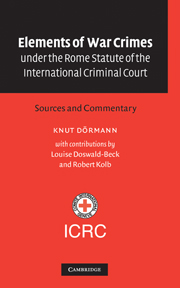 Elements of War Crimes under the Rome Statute of the International Criminal Court
Elements of War Crimes under the Rome Statute of the International Criminal Court Book contents
- Frontmatter
- Contents
- Foreword by Dr Jakob Kellenberger, President of the International Committee of the Red Cross
- Foreword by Ambassador Philippe Kirsch, QC
- Table of cases by alphabetical order
- Table of cases by jurisdiction
- Table of treaties and other international instruments
- List of abbreviations
- 1 Introduction
- 2 Legal value of the elements of crimes
- 3 General Introduction adopted by the PrepCom
- 4 Introduction to elements of war crimes listed in Article 8 of the Rome Statute
- 5 Article 8(2)(a) ICC Statute – Grave breaches of the 1949 Geneva Conventions
- 6 Article 8(2)(b) ICC Statute – Other serious violations of the laws and customs applicable in international armed conflict
- 7 Article 8(2)(c) ICC Statute – Violations of common Article 3 of the 1949 Geneva Conventions
- 8 Article 8(2)(e) ICC Statute – Other serious violations of the laws and customs applicable in armed conflicts not of an international character
- Appendix: Request from the Governments of Belgium, Finland, Hungary, Mexico, the Republic of Korea and South Africa and the Permanent Observer Mission of Switzerland to the United Nations regarding the text prepared by the International Committee of the Red Cross on the mental element in the common law and civil law systems and on the concepts of mistake of fact and mistake of law in national and international law
- Bibliography
- Index
Foreword by Ambassador Philippe Kirsch, QC
Published online by Cambridge University Press: 08 August 2009
- Frontmatter
- Contents
- Foreword by Dr Jakob Kellenberger, President of the International Committee of the Red Cross
- Foreword by Ambassador Philippe Kirsch, QC
- Table of cases by alphabetical order
- Table of cases by jurisdiction
- Table of treaties and other international instruments
- List of abbreviations
- 1 Introduction
- 2 Legal value of the elements of crimes
- 3 General Introduction adopted by the PrepCom
- 4 Introduction to elements of war crimes listed in Article 8 of the Rome Statute
- 5 Article 8(2)(a) ICC Statute – Grave breaches of the 1949 Geneva Conventions
- 6 Article 8(2)(b) ICC Statute – Other serious violations of the laws and customs applicable in international armed conflict
- 7 Article 8(2)(c) ICC Statute – Violations of common Article 3 of the 1949 Geneva Conventions
- 8 Article 8(2)(e) ICC Statute – Other serious violations of the laws and customs applicable in armed conflicts not of an international character
- Appendix: Request from the Governments of Belgium, Finland, Hungary, Mexico, the Republic of Korea and South Africa and the Permanent Observer Mission of Switzerland to the United Nations regarding the text prepared by the International Committee of the Red Cross on the mental element in the common law and civil law systems and on the concepts of mistake of fact and mistake of law in national and international law
- Bibliography
- Index
Summary
On June 30, 2000, the Preparatory Commission for the International Criminal Court (ICC) adopted by consensus the draft Elements of Crimes, elaborating upon the definitions of genocide, crimes against humanity and war crimes contained in the ICC Statute. The Elements document, to be adopted by the ICC Assembly of States Parties, was the culmination of a remarkable codification process by the international community. The negotiations involved experts from a variety of diverse fields, including military lawyers, human rights lawyers and criminal lawyers, working together to reconcile their conflicting perspectives, priorities and backgrounds, to create a single statement on these serious international crimes.
The development of the Elements of Crimes has proven to be a very useful exercise. Because of the general agreement that the definitions of crimes in the ICC Statute were to reflect existing customary international law, and not to create new law, states relied heavily on accepted historical precedents in crafting the definitions in Articles 6 to 8 of the ICC Statute. This approach ensured the widespread acceptability of the definitions, but resulted in an assortment of provisions drawn from different sources and different eras. As a result, terminology was frequently inconsistent and often outdated. The Elements of Crimes negotiations provided the opportunity to unify these provisions in a single coherent structure, reflecting consistent and modern terminology. It was also an opportunity to resolve difficult problems and ambiguities surrounding the interplay of general legal principles, such as the mens rea requirement for particular provisions.
- Type
- Chapter
- Information
- Elements of War Crimes under the Rome Statute of the International Criminal CourtSources and Commentary, pp. xiii - xivPublisher: Cambridge University PressPrint publication year: 2003
- 2
- Cited by
